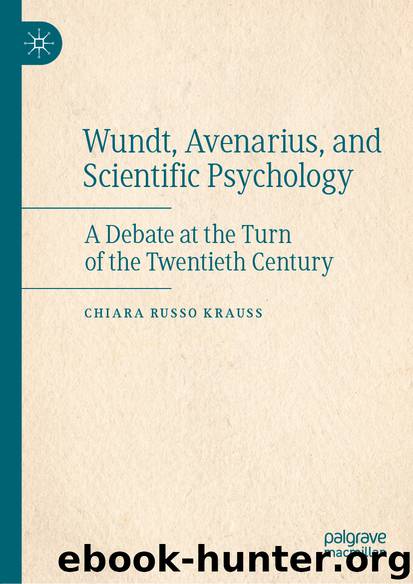Wundt, Avenarius, and Scientific Psychology by Chiara Russo Krauss

Author:Chiara Russo Krauss
Language: eng
Format: epub
ISBN: 9783030126377
Publisher: Springer International Publishing
According to Münsterberg , in psychology we cannot speak of the dependency upon the I of the original experience (the stellungnehmenden Ich, the I-that-takes-stand,) for two reasons: (1) because from this perspective we cannot establish any science, since science presupposes the theoretical-descriptive approach and (2) because the entire experience depends upon this I, so that speaking of the dependency upon this I does not define any specific field of investigation for psychology. Rather, to found psychology, we need a twofold step: (1) abstracting from the original I, that is to say, considering the experience as independent of the I-that-takes-stand in order to obtain the objectified empirical data that are the bases of all science and (2) regarding these data in their dependency upon the individual. So, this latter, psychological individual must be another kind of individual than the one of the original experience .
However, Münsterberg’s clarification of this second step does not seem directed against Avenarius, rather against other interpretation of the definition of psychology by point of view. In fact, when Avenarius talks about the dependency upon the individual, he never means the dependency upon the original subject, rather the functional relationship among certain empirical data (the assertions of the fellow men and their brains). Therefore, we need to specify that Münsterberg presents two different criticisms. (1) The first one is addressed to Avenarius and targets the absolutization of the theoretical perspective, that regards the descriptive and contemplative approach as the only one that is valid. The error of this position is overlooking the original perspective that includes values , ethical judgments, the I-that-takes-stand, etc. and (2) The second criticism is addressed to that particular interpretation of the definition of psychology by point of view of the dependency upon the individual, that wrongly identifies this individual with the I of the immediate experience , the I-that-takes-stand.
We should now ask, according to Münsterberg , who is the individual upon which the psychological experience depends?The psychical cannot be characterized by the dependency upon the I-that-takes-stand, nor by the dependency upon the I-that-is-found [vorgefundenen Ich]. The decisive relationship with the subject is the connection with a third I, namely the I-that-finds [vorfindende Ich], which remained as the condition for the existence of the objects after having imagined away the presentness of the actual I. (Münsterberg [1900] 1918, 71)
Download
This site does not store any files on its server. We only index and link to content provided by other sites. Please contact the content providers to delete copyright contents if any and email us, we'll remove relevant links or contents immediately.
Rewire Your Anxious Brain by Catherine M. Pittman(17589)
Talking to Strangers by Malcolm Gladwell(11879)
The Art of Thinking Clearly by Rolf Dobelli(8842)
Mindhunter: Inside the FBI's Elite Serial Crime Unit by John E. Douglas & Mark Olshaker(7834)
Becoming Supernatural by Dr. Joe Dispenza(7106)
Change Your Questions, Change Your Life by Marilee Adams(6641)
The Road Less Traveled by M. Scott Peck(6635)
Nudge - Improving Decisions about Health, Wealth, and Happiness by Thaler Sunstein(6633)
The Lost Art of Listening by Michael P. Nichols(6474)
Enlightenment Now: The Case for Reason, Science, Humanism, and Progress by Steven Pinker(6405)
Win Bigly by Scott Adams(6312)
Mastermind: How to Think Like Sherlock Holmes by Maria Konnikova(6236)
The Way of Zen by Alan W. Watts(5800)
Daring Greatly by Brene Brown(5641)
Grit by Angela Duckworth(4738)
Big Magic: Creative Living Beyond Fear by Elizabeth Gilbert(4723)
Men In Love by Nancy Friday(4326)
Flow by Mihaly Csikszentmihalyi(4053)
The Four Tendencies by Gretchen Rubin(4024)
